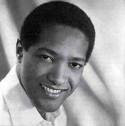 Samuel Cook, better known as Sam Cooke, was born in Clarksdale, Mississippi. He grew up in Chicago, where is father, Reverend Charles Cook, was minister of Christ Holiness Church. By age nine Sam, with his two sisters, formed a gospel trio the Singing Children. As a teenager, he was a member of the nationally famous Highway Q.C.'s (so named because their home base was the Highway Baptist Church) with his younger brother, L.C. Cook. at the age of nineteen, he became lead vocalist of the Soul Stirrers, with whom he toured and recorded for six years.
Samuel Cook, better known as Sam Cooke, was born in Clarksdale, Mississippi. He grew up in Chicago, where is father, Reverend Charles Cook, was minister of Christ Holiness Church. By age nine Sam, with his two sisters, formed a gospel trio the Singing Children. As a teenager, he was a member of the nationally famous Highway Q.C.'s (so named because their home base was the Highway Baptist Church) with his younger brother, L.C. Cook. at the age of nineteen, he became lead vocalist of the Soul Stirrers, with whom he toured and recorded for six years. Cooke soon became a gospel superstar. However, the monetary and worldly rewards for singing gospel could never equal those for singing to the masses. Cooke gave in and recorded "Lovable" under the name Dale Cook. Cooke's voice was to unique not to be recognized. Lovable sold 25,000 copies. Cooke was a ground breaking black music capitalist. He owned his own record label (SAR/Derby), music publishing company (Kags Music), and management firm with offices in the Warner Brothers Building in Hollywood.
With a live LP in the Top 30, Cooke was in L.A. partying when he met 22 year old Elisa Boyer at a club on December 11, 1964. They drove to South Central where they registered at the Hacienda Motel as Mr. and Mrs. Sam Cooke. Later Boyer left the room with most of Cooke's clothing. Cooke wearing one shoe and a jacket broke into the motel's office where he thought she was hiding. There he found Bertha Franklin the motel's manager who shoot him three times with a .22. Cooke was shoot and killed on December 11, 1964 at the Hacienda motel in Los Angeles. The manager of the motel, Bertha Franklin claimed Cooke had tried to rape a twenty one year old woman Elisa Boyer and then turned on her. The coroner's office ruled the death as justifiable homicide. Over thirty five years later there remain questions about the circumstances of Cooke's death and there has been talk about reopening the investigation. "A Change Is Gonna Come" was released in 1965 after his death and charted at #31. It represented a return to Cooke's roots, placing him back in the spiritual setting from which he had first emerged just nine years before.
No comments:
Post a Comment